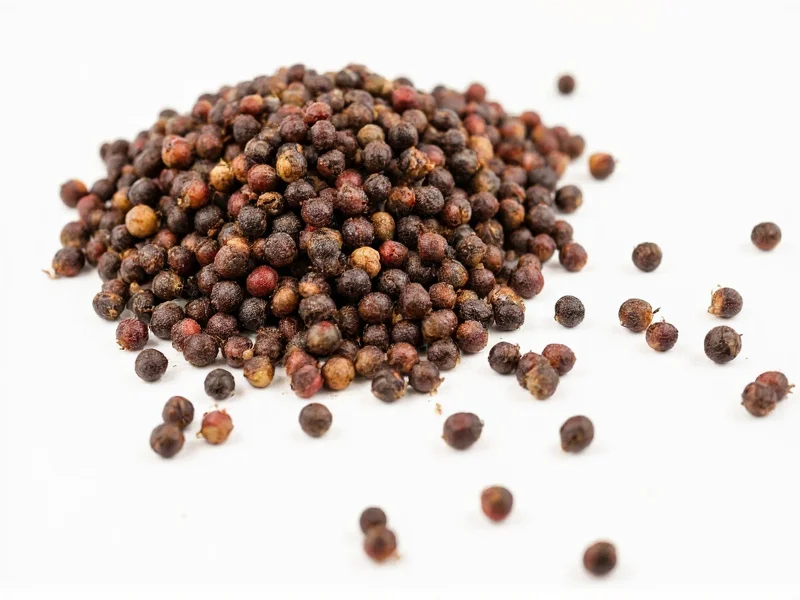When exploring the world of culinary ingredients, few questions seem as straightforward yet nuanced as whether peppercorn qualifies as a spice. The simple answer is definitive: peppercorns are indeed spices, representing one of the most historically significant and widely used spices globally. Understanding why requires examining both botanical classification and culinary tradition.
What Exactly Is a Peppercorn?
Peppercorns come from the Piper nigrum vine, a flowering plant native to South India's Malabar Coast. These small, round berries undergo different processing methods to create the various peppercorn types found in kitchens worldwide. Unlike chili peppers—which belong to the Capsicum genus and are technically fruits—peppercorns originate from a completely different plant family (Piperaceae).
Defining Spices: Why Peppercorns Qualify
In culinary terms, spices are defined as dried parts of plants other than leaves—typically seeds, roots, bark, or fruits. Herbs, by contrast, come from the leafy parts of plants. Since peppercorns are the dried fruit berries of the Piper nigrum plant, they clearly fall under the spice category.
This classification holds true across all peppercorn varieties:
| Peppercorn Type | Processing Method | Flavor Profile |
|---|---|---|
| Black Peppercorn | Sun-dried with outer layer intact | Sharp, pungent, complex |
| White Peppercorn | Soaked to remove outer layer, then dried | Milder, earthier |
| Green Peppercorn | Preserved before full ripening | Fresh, herbal, less pungent |
| Pink Peppercorn | From a different plant (Schinus molle) | Fruity, less spicy |
Peppercorns vs. Other "Peppers": Clearing the Confusion
One common source of confusion stems from the shared "pepper" terminology. True peppercorns (from Piper nigrum) are botanically unrelated to chili peppers (from Capsicum species). This misnomer dates back to European explorers who likened the pungency of chili peppers to that of black pepper.
Understanding this distinction is crucial when exploring is black peppercorn a spice versus chili peppers. While both add heat to dishes, they belong to completely different plant families and have distinct chemical compounds responsible for their spiciness (piperine in peppercorns versus capsaicin in chili peppers).
A Brief History of Peppercorn as a Valuable Spice
Peppercorns have been traded as spices for over 4,000 years, with ancient Indian texts documenting their use. During the Middle Ages, peppercorns were so valuable they were used as currency—hence the phrase "worth his weight in pepper." This historical context reinforces why peppercorn spice definition has remained consistent through centuries of culinary tradition.
The spice's prominence explains why questions about are peppercorns considered spices might arise—when something has been universally accepted as a spice for millennia, the question itself seems almost unnecessary to culinary historians.
Practical Culinary Applications
Understanding why is peppercorn classified as a spice becomes practical when using it in cooking. Different peppercorn varieties serve distinct purposes:
- Black peppercorns: Ideal for most savory dishes, best freshly ground
- White peppercorns: Preferred in light-colored sauces where black specks would be visible
- Green peppercorns: Excellent in creamy sauces and with seafood
- Pink peppercorns: Often used in finishing dishes for visual appeal and mild flavor
Storage and Selection Tips for Peak Flavor
To maximize the spice qualities of peppercorns:
- Store whole peppercorns in airtight containers away from light and heat
- Grind peppercorns immediately before use for optimal flavor release
- Look for uniform color and size when purchasing peppercorns
- Black peppercorns should have a strong aroma when crushed
These practices help maintain the volatile oils that give peppercorns their characteristic pungency—a quality that distinguishes true spices from less flavorful alternatives.
Addressing Common Misconceptions
Some confusion about peppercorn vs chili pepper stems from modern culinary trends that blend these ingredients. While both add heat, they function differently in recipes. Peppercorns provide a sharp, immediate heat that dissipates relatively quickly, while chili peppers offer a more lingering burn.
Another misconception involves pink peppercorns, which aren't true peppercorns but rather berries from a different plant. Despite this botanical difference, they're still classified as spices due to their culinary application and dried fruit origin.
Conclusion: The Undisputed Spice Status of Peppercorns
The question is peppercorn a spice has a clear answer rooted in both botanical science and culinary tradition. As the dried fruit of the Piper nigrum plant, peppercorns meet all criteria for classification as a true spice. Their historical significance, distinctive flavor profile, and culinary applications all reinforce their status as one of the world's most fundamental spices.
Whether you're exploring types of peppercorns and their uses or simply confirming their spice classification, understanding peppercorns' proper categorization helps build culinary knowledge that enhances both cooking and appreciation of global food traditions.
Is black peppercorn considered a spice?
Yes, black peppercorn is absolutely considered a spice. It's the dried fruit berry of the Piper nigrum plant, meeting the botanical and culinary definition of a spice as a non-leaf plant part used for flavoring.
What makes peppercorn different from other peppers?
Peppercorns come from the Piper nigrum plant (Piperaceae family), while chili peppers belong to the Capsicum genus (Solanaceae family). They contain different compounds for heat (piperine vs. capsaicin) and have distinct flavor profiles and culinary uses.
Are all types of peppercorns classified as spices?
Yes, all true peppercorns (black, white, and green from Piper nigrum) are classified as spices. Pink peppercorns, while from a different plant (Schinus molle), are also considered spices due to their dried fruit origin and culinary application.
Why is pepper called a spice when it comes from berries?
In culinary terms, spices include dried seeds, fruits, roots, or bark of plants. Since peppercorns are the dried fruit berries of the Piper nigrum plant, they qualify as spices rather than herbs (which come from leafy parts of plants).
Can peppercorn be considered both a spice and a seasoning?
Yes, peppercorn functions as both. As a spice, it's a specific dried plant product. As a seasoning, it's used to enhance flavor. All spices can be seasonings, but not all seasonings are spices (salt is a seasoning but not a spice).











 浙公网安备
33010002000092号
浙公网安备
33010002000092号 浙B2-20120091-4
浙B2-20120091-4